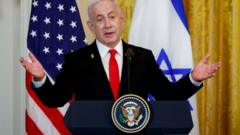The delicate ceasefire between Israel and Hamas is threatened anew as negotiations stumble and tensions rise.
**Ceasefire in Gaza Faces New Setbacks as Tensions Escalate**

**Ceasefire in Gaza Faces New Setbacks as Tensions Escalate**
Doubts grow over the future of the ceasefire agreement as Israel delays Palestinian prisoner releases.
As the first phase of the ceasefire between Israel and Hamas approaches its conclusion, uncertainty looms regarding the future of the agreement. Israeli Prime Minister Benjamin Netanyahu has decided to indefinitely postpone the release of over 600 Palestinian prisoners, which was set to be the largest single release since the conflict resumed. This decision follows the recent release of the last six Israeli hostages, which Israeli officials claim was marred by security concerns.
Netanyahu has called for Hamas to cease what he describes as its "cynical use of hostages for propaganda purposes." In retaliation, Hamas has accused Israel of orchestrating disruptions to the ceasefire process. This tug-of-war is emblematic of the ongoing volatility that characterizes the region and the fragile nature of the ceasefire.
During the initial phases, there were chaotic scenes reported during hostage exchanges, leading Israel to raise concerns about the physical safety of its citizens. Israel contended that Hamas breached agreement terms by not releasing a female civilian hostage, prompting a temporary halt to aid access for Palestinians returning to northern Gaza until that issue was rectified. This culminated in the eventual release of the hostage, Arbel Yehud, but not without significant drama.
Hamas's claims of Israel failing to honor its obligations regarding the flow of humanitarian supplies into Gaza only further complicate matters. The situation escalated when Hamas announced it would not proceed with the next hostage handover, to which Netanyahu and U.S. President Trump responded with threats of renewed military action in the region. Under pressure, Hamas ultimately acquiesced, releasing the remaining hostages as the deadline approached.
The discovery of a misidentified corpse during the handover process intensified outcries within Israel, especially from families of hostages, leading Netanyahu to label Hamas's actions as a "cruel and evil violation" of their accord. The culmination of these instances has contributed to the lack of progress in initiating talks for the second phase of the ceasefire, scheduled for earlier this month.
Hamas has put forth conditions for the next round of negotiations, proposing the release of all remaining hostages only if Israel withdraws its military forces and agrees to a permanent ceasefire. Conversely, Israel maintains that it will not budge on the complete disarmament of Hamas.
The situation is further complicated by political pressures within Israel, with hardline factions urging military resumption against Hamas, whereas families of hostages seek the utmost priority on their loved ones’ release. Former President Trump’s new plans for Gaza have injected additional uncertainty into potential pathways for stabilization and reconstruction.
Amid these complex dynamics, regional mediators from Egypt, Qatar, and the U.S. are under considerable pressure to facilitate negotiations essential for ensuring the ceasefire's continuation while navigating the potential for renewed violence, which still lingers as an ever-present threat.






















